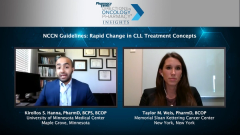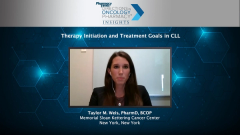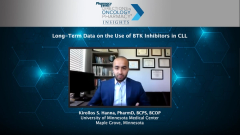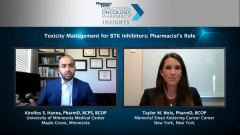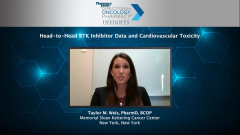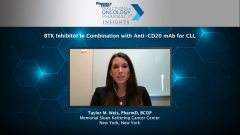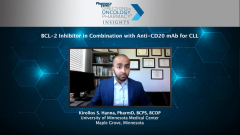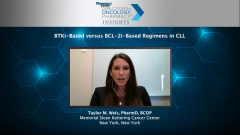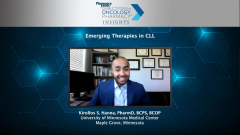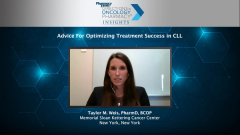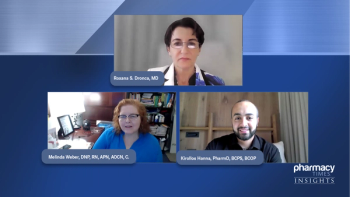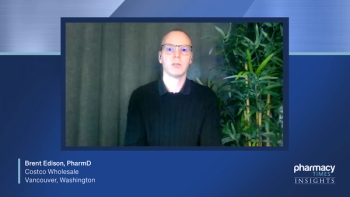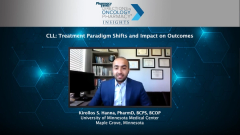
BTKi-Based Vs BCL2i-Based Regimens in CLL
Experts discuss factors and approaches to consider if choosing between a BTKi-based and BCL2i-based regimen for frontline therapy in CLL.
Episodes in this series

Kirollos S. Hanna, PharmD, BCPS, BCOP: Dr Weis, I would love to hear from you about when you’re picking therapy. We talked a little about the ambiguity of BTK [Bruton tyrosine kinase inhibitor] versus BTK plus anti-CD20 [monoclonal antibody]. Now, what about BTK versus BCL2? How are you treating MRD [minimal residual disease] negativity? What do you see in the literature and in your clinical practice in terms of picking one regimen over the other? I would love to see what you guys are doing up there in New York.
Taylor M. Weis, PharmD, BCOP: Yes, clearly, there are no randomized controlled trials in this area. The comparator arm in all these BTK inhibitor, randomized clinical trials, the venetoclax and obinutuzumab- based trials, the control arm is often a chemoimmunotherapy approach, with often chlorambucil. We don’t know exactly head-to-head which regimen is better than the other in terms of efficacy. What we can do is look at patients’ specific factors, [adverse] effect profile, the data we have, and try a cross-trial comparison, however flawed that might be, to the best of our abilities. We go through pros and cons of each approach. In terms of BTK inhibitor-based therapies, the biggest upside I think is convenience for a lot of patients. It’s often scary to get a cancer diagnosis, and a lot of times just the relief you hear when you tell a patient there’s an oral medication that they can take once or twice a day; it can be a lot for a patient. Lots of times we have patients who live very far away. It’s nice that they don’t have to come to the clinic for monitoring as frequently. They don’t have to get infusions and infusion monitoring, so convenience really is a pro there. We do have the longest follow-up with these BTK inhibitor studies, and while we are getting longer follow-up from venetoclax and obinutuzumab in the frontline setting, we still do see that after about a year, after the fixed duration of treatment has ended, we are seeing progression events. It does seem that potentially patients with high-risk features, like deletion 17p or TP53 mutations, may be having progression events more so than the rest of the population. So this will be something that we’ll need to monitor with other longer follow-up studies.
We also have some information about when a patient progresses on a BTK inhibitor. We have some retrospective studies showing that venetoclax-based approaches can have induced response rates in these patients, so we know they can be salvaged with other novel agents. Also, you mentioned before that tumor lysis risk can be concerning for some patients, and although we follow the ramp-up, we do weekly ramp-ups for 5 dose levels. If a patient is high risk for tumor lysis, we admit them for monitoring with fluids and allopurinol. Thus, there are a lot of things we can do to mitigate this, but we sometimes have patients who have stage 3 CKD [chronic kidney disease] or severe renal dysfunction that could be very dangerous, the electrolyte shifts from this regimen. In that case, we often do BTK inhibitors. There are some cons though, cardiovascular [adverse] effects, bleeding [adverse] effects; these are older patients with a lot of comorbidities. That’s something we consider as well.
Kirollos S. Hanna, PharmD, BCPS, BCOP: OK.
Taylor M. Weis, PharmD, BCOP: In terms of BCL2 inhibitor-based regimens, I think for a lot of our younger patients, it’s very appealing. Some of them think of it as a light at the end of the tunnel. It’s not a medication that they’re going to have to take indefinitely, as long as it’s benefiting them. They have an end point, and a lot of times just knowing that in 12 months they could potentially be treatment free can be very motivating for these patients. Not to mention cost savings if they have a durable response and not having to stay on a very expensive oral medication indefinitely.
Kirollos S. Hanna, PharmD, BCPS, BCOP: I think that as we continue to see data maturation and further end points, and hopefully as we reach this overall survival difference that these potentially have, this could change the lay of this entire landscape in terms of cost effectiveness, because it’s a finite duration, as well improving overall survival. That could be a great thing.
Transcript edited for clarity.
Newsletter
Stay informed on drug updates, treatment guidelines, and pharmacy practice trends—subscribe to Pharmacy Times for weekly clinical insights.

